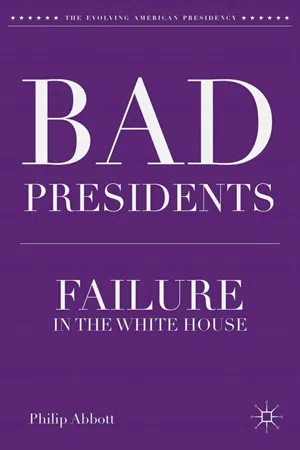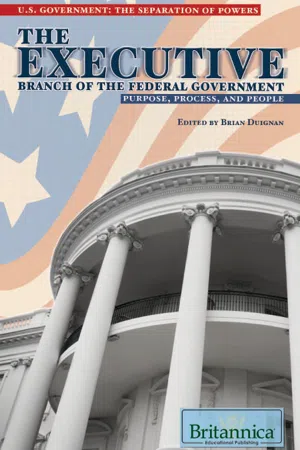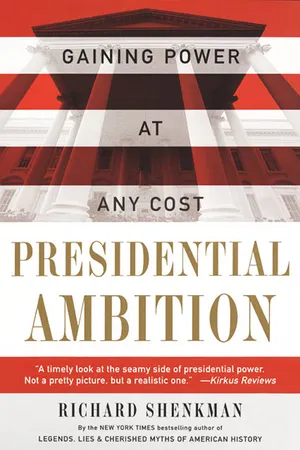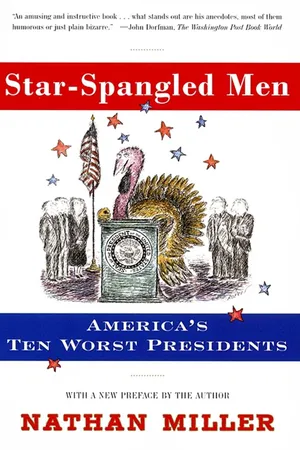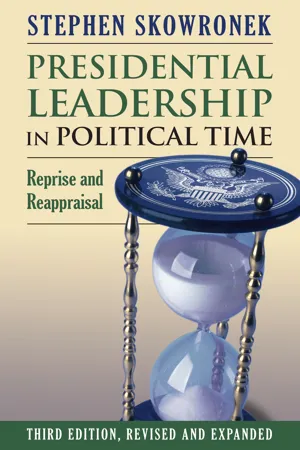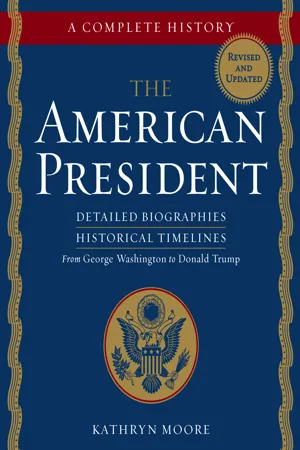History
President Franklin Pierce
Franklin Pierce was the 14th President of the United States, serving from 1853 to 1857. He is known for his support of the controversial Kansas-Nebraska Act, which allowed for the expansion of slavery into new territories. His presidency was marked by growing tensions over the issue of slavery, ultimately contributing to the outbreak of the Civil War.
Written by Perlego with AI-assistance
Related key terms
Related key terms
1 of 4
Related key terms
1 of 3
6 Key excerpts on "President Franklin Pierce"
- eBook - ePub
Bad Presidents
Failure in the White House
- P. Abbott(Author)
- 2013(Publication Date)
- Palgrave Macmillan(Publisher)
Chapter Four The Byronic President: Franklin Pierce If the tipping point in Fillmore’s badness is his support of the Compromise of 1850 and its enforcement, Pierce’s is his support of the Kansas-Nebraska Act and its implementation.But these actions, however much they damn Pierce, do not necessarily fit with the assessments of Theodore Roosevelt and Truman who called Pierce a “servile tool” and a “fizzle,” respectively. Pierce was initially reluctant to support the measure, but then seemed to know what he wanted from the act and acted very aggressively to make it the signature legislation of the Democratic Party and ensure its successful implementation. Like Fillmore, the question is whether Pierce was bad like Richard II or as, Lincoln suggested, like Richard III. Of course, even Richard II had his moments of forcefulness, such as when he seized the estate of the Bolingbroke. But the primary image of his reign is one of his ineptitude and unfitness for office. Were Pierce’s confrontations with antislavery forces in the territory like this pattern of fitful self-assertion?It is interesting that one of the central and reoccurring motifs used to support Pierce’s badness is his looks. Two assessment of Pierce, over 60 years apart, illustrate this motif. In 1942, Allan Nevins described Pierce as a “one of the most gracefully attractive” of presidents. He was “gay, loquacious, bubbling over with kindness and beguilingly demonstrative.” But although Pierce was a “highly engaging person,” his supporters soon discovered these “effervescent boyish traits” were all he had to offer. Pierce’s vanity (he was “conscious of his handsome head and fine bearing” and wore clothing “more striking than dignified”) fit well with the ceremonial aspects of the office. He, like Richard II, took “obvious delight” in his new position. Otherwise, Pierce was “on the whole a man of shallow nature”: “No depth of conviction, no powerful force of will, underlay his bright surface qualities.”1 - eBook - ePub
The Executive Branch of the Federal Government
Purpose, Process, and People
- Britannica Educational Publishing, Brian Duignan(Authors)
- 2009(Publication Date)
- Britannica Educational Publishing(Publisher)
In 1852 Fillmore was one of three presidential candidates of a divided Whig Party in its last national election, which it lost. He ran again in 1856 as the candidate of the Know-Nothing party (also known as the American Party), finishing third behind Democrat James Buchanan and Republican John C. Frémont. Fillmore then retired to Buffalo, where he became a leader in the city’s civic and cultural life. In 1858, some five years after the death of his wife Abigail, he married Caroline Carmichael McIntosh.FRANKLIN PIERCE
(b. Nov. 23, 1804, Hillsboro, N.H.—d. Oct. 8, 1869, Concord)F ranklin Pierce was the 14th president of the United States (1853–57). As president he failed to deal effectively with the corroding sectional controversy over slavery in the decade preceding the American Civil War (1861–65).The son of a governor of New Hampshire, Benjamin Pierce, and the former Anna Kendrick, Franklin Pierce attended Bowdoin College in Maine, studied law in Northampton, Mass., and was admitted to the bar in 1827. He married Jane Means Appleton, whose father was president of Bowdoin, in 1834.Pierce entered political life in New Hampshire as a Democrat, serving in the state legislature (1829–33), the U.S. House of Representatives (1833–37), and the Senate (1837–42). Handsome, affable, charming, and possessed of a certain superficial brilliance, Pierce made many friends in Congress, but his career there was otherwise undistinguished. He was a devoted supporter of Pres. Andrew Jackson but was continually overshadowed by older and more prominent men on the national scene. Resigning from the Senate for personal reasons, he returned to Concord, where he resumed his law practice and also served as federal district attorney.Except for a brief stint as an officer in the Mexican War (1846–48), Pierce remained out of the public eye until the nominating convention of the Democratic Party in 1852. After a deadlock developed among supporters of the leading presidential contenders, a coalition of New England and Southern delegates proposed “Young Hickory” (a reference to Andrew Jackson, who had been known as “Old Hickory”), and Pierce was nominated on the 49th ballot. The ensuing presidential campaign was dominated by the controversy over slavery and the finality of the Compromise of 1850. Although both the Democrats and the Whigs declared themselves in favour of the compromise, the Democrats were more thoroughly united in their support. As a result, Pierce, who was almost unknown nationally, unexpectedly won the November election, defeating the Whig candidate Winfield Scott by 254 votes to 42 in the electoral college. Pierce’s triumph was quickly marred by tragedy, however, when, a few weeks before his inauguration, he and his wife witnessed the death of their only surviving child, 11-year-old Bennie, in a railroad accident. Jane Pierce, who had always opposed her husband’s candidacy, never fully recovered from the shock. - eBook - ePub
Presidential Ambition
Gaining Power At Any Cost
- Richard Shenkman(Author)
- 2011(Publication Date)
- HarperCollins e-books(Publisher)
A likable man from youth, Pierce remained likable throughout his presidency. Likable, he aroused little hatred. If anything, because of the tragic death of little Bennie, Americans seemed to feel real warmth for him. Few presidents had ever seemed so human, so vulnerable.But as the country’s troubles over slavery began to accumulate and grow more intense—these were the years, after all, when Kansas began to bleed, as pro-and antislavery factions came to blows—Pierce came to be regarded as a man who was ill suited for the high office to which he had been elected. As the slavery crisis grew worse, Americans looked forward to the day when Pierce would leave.So, too, did Jane. Pierce—over Jane’s objections—made a pathetic attempt to win a second term, but was, of course, unsuccessful.No one in the United States was happier at that than his wife. At last they would be through with politics. Not because he wanted to be through with it, but because the politicians and the people were through with him.* Cass, a native of New Hampshire, had been a hero in the War of 1812. Later he was appointed governor of the Territory of Michigan. He was by this time serving as secretary of war under Andrew Jackson.* Pierce had helped prepare the instructions that would guide the duelists; the duel ended in the death of his friend and fellow Bowdoin classmate, Maine representative Jonathan Cilley, Whig editor of accepting bribes from the Bank of the United States.* From the start the war had been most popular in the South and the West. New Englanders were suspicious that it had been foisted on the country by slaveholders eager to expand the “peculiar institution” westward.* 21The Free-Soil Party, organized in 1848, opposed the extension of slavery. Its platform declared bluntly, “[N]o more slave states and no more slave territories.”* The Compromise of 1850 provided for the admission of California as a free state and abolished the slave trade in Washington, D.C., but Southerners enthusiastically backed the deal because it required Northerners to return fugitive slaves.* - eBook - ePub
Star-Spangled Men
America's Ten Worst Presidents
- Nathan Miller(Author)
- 2008(Publication Date)
- Scribner(Publisher)
On first glance, Pierce seemed a highly engaging figure. At forty-eight he was the youngest man to become president until then. He had chiseled features, a proud bearing, and a great sweep of curly, dark hair, all of which made him one of the handsomest men ever to hold the office. Always conscious of his appearance, Pierce dressed richly even when working in his White House office, sometimes wearing a dazzling dressing gown lined with cherry-colored silk. People liked him—until they realized that nothing was behind the backslapping and the casual invitations to lunch and dinner except a careless goodwill.The tragedy of Pierce’s presidency is that it was the last chance to prevent the breakup of the Union before the nation was engulfed by the Civil War. Swept into office by the largest Electoral College majority since James Monroe and backed by big majorities in Congress, Pierce had the best opportunity of any president of the period to resolve the disruptive slavery question. If the storm that climaxed in war is likened to a hurricane, he came to the White House within its eye. To many Americans, the Compromise of 1850 seemed to have settled the major differences between North and South. Indeed, when Charles Sumner of Massachusetts arrived in the Senate in 1851, he was told, “You have come upon the scene too late, sir. There is nothing left to settle except petty, sectional disturbances over slavery.”11In reality, the political system of the founding fathers was unravelling. The president was supposed to represent all the people, but the fight over slavery was destroying the basis for national consensus—and Pierce crossed the line to become an open supporter of the South. Had he been more imaginative, he might have made a Jacksonian appeal to the common man by supporting a homestead act to provide cheap land to small farmers, a bill to create land-grant colleges open to all, and tariff reduction. Franklin Pierce lacked the character, the broad vision, and the political skills to meet this challenge. The blame does not rest solely upon his diffident shoulders. It partially belongs to a volatile political situation that made it impossible to elect candidates in 1852 and again in 1856 who were qualified to deal with the crisis. Only nonentities who angered no one could attract enough votes to win. - eBook - ePub
Presidential Leadership in Political Time
Reprise and Reappraisal
- Stephen Skowronek(Author)
- 2024(Publication Date)
- University Press of Kansas(Publisher)
The successful reassembling of broken coalitions left Pierce and Carter to ponder the peculiar challenge of leading an enervated regime. These presidents engaged the political system at a step removed from an assertion of managerial control over the interests with which they were affiliated. Because they were tenuously attached to a governmental establishment that itself appeared barren of any interest in addressing the most pressing problems of the day, their leadership turned on a question so narrow that it really is prerequisite to leadership—that of their own credibility. Despite determined efforts to establish credibility, neither Pierce nor Carter could reconcile his own awkward position in the old order with the awkward position of the old order in the nation at large. Caught between the incessant demands of regime interests and festering questions about the governing assumptions that had supported those interests in the past, neither could find secure ground on which to make a stand to limit the inevitable political fallout that comes from executive action. What began in expedience simply dissolved into irrelevance.Franklin PierceIn 1852 , Franklin Pierce carried twenty-seven of the thirty-one states for a hefty 250 out of 296 electoral votes.36 In the process, the Democratic Party strengthened its hold over both houses of Congress. But the Pierce landslide was more apparent than real, and the election was anything but a mandate for action. As a presidential candidate, Pierce had simply endorsed the past work of a bipartisan group of Senate moderates. His campaign was confined to a declaration of support for the Compromise of 1850 as the “final” solution to the slavery issue and a pledge to resist any further agitation on this, the issue that underlay all other national concerns. The Pierce campaign was nothing if not a dutiful bow to senatorial authority and moderate political opinion.It is possible that the new president might have enhanced his position at the start of his term by taking a second bow to the center and placing the full largesse of his office at the disposal of the Senate moderates. But there were other aspects of the election that argued against this approach. Pierce had actually received less than 51 percent of the popular vote. He had won the presidency not because the moderate center of national opinion had rallied to his standard, but because the party managers working in the field had reassembled support at the political extremes. To these extremes, the Compromise of 1850 - eBook - ePub
The American President
A Complete History
- Kathryn Moore, Kathryn Moore(Authors)
- 2018(Publication Date)
- Union Square & Co.(Publisher)
Franklin Pierce was the second “dark horse” candidate to win the presidency. In contrast to the first, James K. Polk, who entered office knowing his precise objectives, Pierce entered office less sure of himself, which allowed others the opportunity to sway his opinion regarding the controversial issues facing the nation in the days before the Civil War. Although he hoped to avoid war, by signing the Kansas-Nebraska Act, Franklin Pierce moved the country on an accelerated pace toward it.CABINET ★ ★ ★ ★ ★ ★ ★ ★ ★ ★SECRETARY OF STATE William L. Marcy (1853–1857) SECRETARY OF THE TREASURY James Guthrie (1853–1857) SECRETARY OF WAR Jefferson Davis (1853–1857) ATTORNEY GENERAL Caleb Cushing (1853–1857) SECRETARY OF THE NAVY James C. Dobbin (1853–1857) POSTMASTER GENERAL James Campbell (1853–1857) SECRETARY OF THE INTERIOR Robert McClelland (1853–1857)EARLY LIFE
Benjamin Pierce, father to the president, was descended from early Massachusetts settlers. He later described how he was plowing a field when he heard of the fighting at Lexington and Concord, so he stopped the team, grabbed his gun, and started walking toward the Boston area. He served as a militia commander throughout the Revolution. Afterward, he moved his family to New Hampshire, where his son Franklin was born on November 23, 1804, to Benjamin’s second wife, Ann Kendrick. (They had seven children who survived to maturity.)Franklin attended school in his hometown of Hillsborough and was a fine student. He continued his education in nearby academies at Hancock and Francestown, New Hampshire, then in 1820 entered Bowdoin College in Maine. He did very little during his first two years—including attending class—and he dropped to the bottom of his class. He did, however, find time to make friends, including Nathaniel Hawthorne and Henry Wadsworth Longfellow. Finally his grades improved, and he completed his liberal arts curriculum while remaining active in other activities, including serving as captain of the military company that the young men formed on campus. Franklin graduated in July 1824, but without his father’s company, since the elder Pierce was off to Portsmouth to meet Lafayette on his grand tour of the country.
Index pages curate the most relevant extracts from our library of academic textbooks. They’ve been created using an in-house natural language model (NLM), each adding context and meaning to key research topics.
Explore more topic indexes
Explore more topic indexes
1 of 6
Explore more topic indexes
1 of 4
